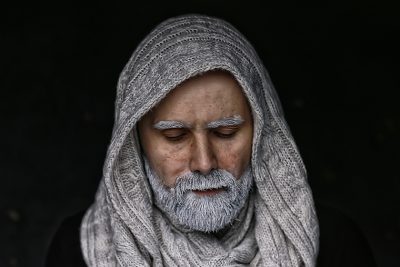×


We have detected your country as:
Please click here to go to the USA website or select another country from the dropdown list.
by: Rev. Cheryl L. Hauer, International Vice President
Few phrases in the English language bring with them such a sense of relief and restoration of joy as those three little words: “I forgive you.” Whether we are the extender or the recipient of the pardon, such joy is the result of the freedom we experience when we are released from the prison of unforgiveness and set free to find reconciliation.
Experts tell us that the vast majority of people today struggle with feelings of guilt—often for things that were not their fault to begin with—yet they never seek forgiveness from those they may have wronged. Others spend their lives consumed with pain and anger, having been wronged by another, yet unable to extend the forgiveness that would bring them freedom. Either way, the Bible makes it clear that unforgiveness is a tool the enemy would use to shipwreck our faith, and in essence, ruin our lives by robbing us of joy and filling us instead with pain and hate.
 Today, psychologists define forgiveness as a “conscious, deliberate decision to release feelings of resentment or vengeance toward a person or group who has harmed you, regardless of whether they actually deserve your forgiveness.” Our modern world is rife with hatred and mounting violence, which perhaps to some degree has at its heart a lack of forgiveness. But the actions of forgiving one another and forgiving ourselves, those experts tell us, involve complex psychological processes that profoundly affect us physically as well as mentally and can take years to implement…if ever. They paint a rather bleak picture with little hope of freedom for those in bondage to feelings they are unable or unwilling to surrender.
Today, psychologists define forgiveness as a “conscious, deliberate decision to release feelings of resentment or vengeance toward a person or group who has harmed you, regardless of whether they actually deserve your forgiveness.” Our modern world is rife with hatred and mounting violence, which perhaps to some degree has at its heart a lack of forgiveness. But the actions of forgiving one another and forgiving ourselves, those experts tell us, involve complex psychological processes that profoundly affect us physically as well as mentally and can take years to implement…if ever. They paint a rather bleak picture with little hope of freedom for those in bondage to feelings they are unable or unwilling to surrender.
The writer of the book of Ephesians uses strong language as he paints a picture of this life-and-death struggle to release our pain to the Lord rather than allow the enemy to entrap us with it. An understanding of the Greek meaning of his words in Ephesians 4:31, however, brings even deeper clarity:
Rather, he tells us in verse 32:
And then he gives us the key to our freedom:
How fortunate we are that our God does not leave His children helplessly drowning in that morass of pain and bitterness. He has provided the keys that will unlock those prison doors, and we find them in the Bible—biblical truths that make it possible for us to forgive others and ourselves and walk in the victory and freedom that He intends for His children.
The story of Joseph is considered by some to be a treatise on forgiveness. The depth of Joseph’s message to us can easily be lost without a true understanding of his life, his experiences and the treatment he received from those around him. Let us spend some time examining that life and searching for those truths that will set us free.
 Joseph’s was indeed a life filled with intrigue, adventure, deception and hatred, not to mention deliverance, justice, mercy and prosperity. However, that life cannot really be understood without stepping back to his father Jacob’s search for a wife. In ancient Middle East, it was common for parents to look for spouses for their sons among existing family. Therefore, as a young man, Jacob traveled to Padan Aram, where his mother had originated and where her family still lived.
Joseph’s was indeed a life filled with intrigue, adventure, deception and hatred, not to mention deliverance, justice, mercy and prosperity. However, that life cannot really be understood without stepping back to his father Jacob’s search for a wife. In ancient Middle East, it was common for parents to look for spouses for their sons among existing family. Therefore, as a young man, Jacob traveled to Padan Aram, where his mother had originated and where her family still lived.
Upon seeing his cousin Rachel, Jacob fell immediately in love. However, her father, Laban, told him that he would have to work with Laban’s flocks for seven years to earn the privilege of marrying her. Scripture tells us he loved her so much that the seven years seemed like “only a few days” (Gen. 29:20) as he anticipated his wedding. However, on his wedding night, Laban’s two heavily veiled daughters were switched, and much to Jacob’s surprise, he ended up marrying Leah, Rachel’s older sister. He was, of course, incensed. Laban explained that custom demanded that the older daughter marry first, a justification that at least opened the door for him to marry Rachel second. His determination to be married to the woman he loved was so strong that he agreed to work an additional seven years in order to make Rachel his wife in addition to Leah.
 Throughout most of their married life, Rachel was barren. For years, she wept and cried out to God for a son, while, as was custom, Jacob fathered children with his first wife, Leah, and two of his wives’ handmaidens. Finally, the Bible tells us God heard Rachel’s cries and opened her womb. At long last, she bore Jacob a son. Her firstborn, Joseph, was the delight of Jacob’s life, the answer to his many prayers, the treasured offspring of his beloved. To their delight, Rachel miraculously became pregnant again, and her second son, Benjamin, was born a few years later. Tragically, however, she died in childbirth, which only served to make Joseph all the more precious in Jacob’s sight. Joseph’s ten older brothers would always play a subordinate role to Rachel’s sons, but Joseph, the firstborn of the only woman Jacob truly loved, would always be first in Jacob’s life.
Throughout most of their married life, Rachel was barren. For years, she wept and cried out to God for a son, while, as was custom, Jacob fathered children with his first wife, Leah, and two of his wives’ handmaidens. Finally, the Bible tells us God heard Rachel’s cries and opened her womb. At long last, she bore Jacob a son. Her firstborn, Joseph, was the delight of Jacob’s life, the answer to his many prayers, the treasured offspring of his beloved. To their delight, Rachel miraculously became pregnant again, and her second son, Benjamin, was born a few years later. Tragically, however, she died in childbirth, which only served to make Joseph all the more precious in Jacob’s sight. Joseph’s ten older brothers would always play a subordinate role to Rachel’s sons, but Joseph, the firstborn of the only woman Jacob truly loved, would always be first in Jacob’s life.
As any mother knows, nothing breeds trouble among the kids as quickly as the jealousy brought on by any hint of favoritism: “How come he could…?” “Why did she get to…?” “You wouldn’t let me…” Teaching children to rejoice in their siblings’ accomplishments and rewards can sometimes be tough. It certainly was for Jacob and his 12 sons. Morover, it was complicated by the fact that his sons knew Jacob did indeed love Joseph more. Such favoritism wasn’t new or unusual to Jacob. He grew up in a family that was constantly in turmoil, divided by the favoritism of his parents. His father, Isaac, openly preferred his brother Esau over him, while his mother, Rebecca, favored Jacob over his sibling.
 Jacob only made the situation worse when he gifted his favored son with what became known as “a coat of many colors.” Actually, it would have been a soft woolen cloak that reached the floor, had long sleeves and was decorated with vibrant embroidery, unlike the colorless, sleeveless and rough-woven garments worn by everyone else. In that ancient desert culture, such extravagant garments were reserved for use only by tribal chieftains. Clearly, Jacob was doing more than blessing his son with a pretty jacket. He was making a statement to the rest of his children and the surrounding tribes. Joseph would be his heir, the head of the clan, even though such an inheritance should by custom go to the firstborn son.
Jacob only made the situation worse when he gifted his favored son with what became known as “a coat of many colors.” Actually, it would have been a soft woolen cloak that reached the floor, had long sleeves and was decorated with vibrant embroidery, unlike the colorless, sleeveless and rough-woven garments worn by everyone else. In that ancient desert culture, such extravagant garments were reserved for use only by tribal chieftains. Clearly, Jacob was doing more than blessing his son with a pretty jacket. He was making a statement to the rest of his children and the surrounding tribes. Joseph would be his heir, the head of the clan, even though such an inheritance should by custom go to the firstborn son.
It seemed that Joseph was almost a partner with Jacob in managing the other 11, spying out their activities and reporting to Jacob on their behavior. Such favoritism might have felt good to Jacob, keeping his precious son near him in a constant memorial to his favorite wife, but it only engendered increasing hatred for Joseph.
The end of Joseph’s life with his family in the land of Israel began innocently enough. As was his custom, Jacob sent Joseph off to spy on his brothers. This time, however, it was a bit of a trek. From their home in Hebron, it was a 50-mile (80-km) hike over dangerous, mountainous terrain to Dothan, where Joseph would connect with his brothers and Jacob’s flocks. For the brothers, the situation was just too perfect, the temptation too strong. At last, they could be rid of this wretched dreamer, the bane of their existence—and no one would be the wiser. How easy it would be to convince their father that a wild beast had devoured him on the dangerous journey across the mountains. “Let’s kill him,” they said, “and throw him in a pit somewhere.”
 In Genesis 37:25, the depth of the hatred Joseph’s brothers felt for him is clearly revealed in their heartless action that would haunt them for years to come. Joseph, stripped nearly naked, bruised and terrified, cried out to them for mercy, begging them to remove him from the pit and allow him to return home. Ignoring Joseph’s pain and terror, they callously sat down to eat a meal. Years later as they stood before the leader of Egypt, confused and terrified themselves, that sin was first in their thoughts. “Then they said to one another, ‘We are truly guilty concerning our brother, for we saw the anguish of his soul when he pleaded with us, and we would not hear; therefore this distress has come upon us’” (Gen. 42:21).
In Genesis 37:25, the depth of the hatred Joseph’s brothers felt for him is clearly revealed in their heartless action that would haunt them for years to come. Joseph, stripped nearly naked, bruised and terrified, cried out to them for mercy, begging them to remove him from the pit and allow him to return home. Ignoring Joseph’s pain and terror, they callously sat down to eat a meal. Years later as they stood before the leader of Egypt, confused and terrified themselves, that sin was first in their thoughts. “Then they said to one another, ‘We are truly guilty concerning our brother, for we saw the anguish of his soul when he pleaded with us, and we would not hear; therefore this distress has come upon us’” (Gen. 42:21).
Clearly, these men had lived for years with a burden of guilt, not knowing what had happened to Joseph, what the final outcome of their actions had been. They could not have helped seeing the impact their actions had on their father. For years, they lived a lie and watched their deceitfulness destroy his life. How could anyone ever forgive them?
Yet Joseph did. When he was satisfied that they were truly repentant, he opened his heart and his life to his brothers. He assured them that he recognized God’s hand in what had happened, that God had positioned him to be a channel of rescue for his family and for generations of God’s people yet to come. It is hard to imagine the feeling of relief, gratitude and freedom they experienced when they discovered that Joseph had truly forgiven them. Or did they?
I believe it was their inability to forgive themselves for what they had done that caused them to doubt Joseph’s forgiveness. They were filled with fear upon the death of their father that Joseph would show his true colors, that he would hate them as they had hated him, that he would exact vengeance upon them for their sin. Perhaps their hearts were finally free when Joseph spoke only words of love and reassurance.
How often we are guilty of that same unbelief. We know that nothing is hidden from God, that He has seen the darkness of our sin and kept our tears of repentance tenderly in a bottle (Ps. 56:8). We know that He loves us passionately and that nothing—literally nothing—can separate us from His love (Rom. 8:1). We know that He is relentless in His tenderness toward mankind and offers forgiveness to all who would come to Him with a heart of repentance (Isa. 55:7).
Yet somehow we refuse to let go of the guilt we feel, allowing the enemy to convince us that we are not worthy of forgiveness. We walk in shame, sometimes even self-loathing, because, like Joseph’s brothers, we doubt His forgiveness. We can say with King David, “Because of the voice of the enemy…fearfulness and trembling have come upon me” (Ps. 55:3–5). But the simple truth is a love so compassionate and so infinite that we are hard-pressed as humans to grasp its reality. If only we would silence the voice of the enemy and listen to the voice of the One who forgives:
“…Who heals all your diseases, who redeems your life from destruction, who crowns you with lovingkindness and tender mercies, who satisfies your mouth with good things…The LORD is merciful and gracious, slow to anger, and abounding in mercy…He has not dealt with us according to our sins, nor punished us according to our iniquities. For as the heavens are high above the earth, so great is His mercy toward those who fear Him; as far as the east is from the west, so far has He removed our transgressions from us” (Ps. 103:3–5, 8, 10–12).
This is the first in a two-part series exploring the power of forgiveness that sets us free from pain, anger and hate to live a life of joy and peace.
Photo Credit: Click on photo to see photo credit
Vine, W.E., Unger, Merrill F., and White, William Jr., eds. Vine’s Expository Dictionary of Biblical Words. Nashville: Thomas Nelson Publishers, 1985.
“What Is Forgiveness?” Greater Good Magazine. https://greatergood.berkeley.edu/topic/forgiveness/definition
All logos and trademarks in this site are property of their respective owner. All other materials are property of Bridges for Peace. Copyright © 2025.
Website Site Design by J-Town Internet Services Ltd. - Based in Jerusalem and Serving the World.